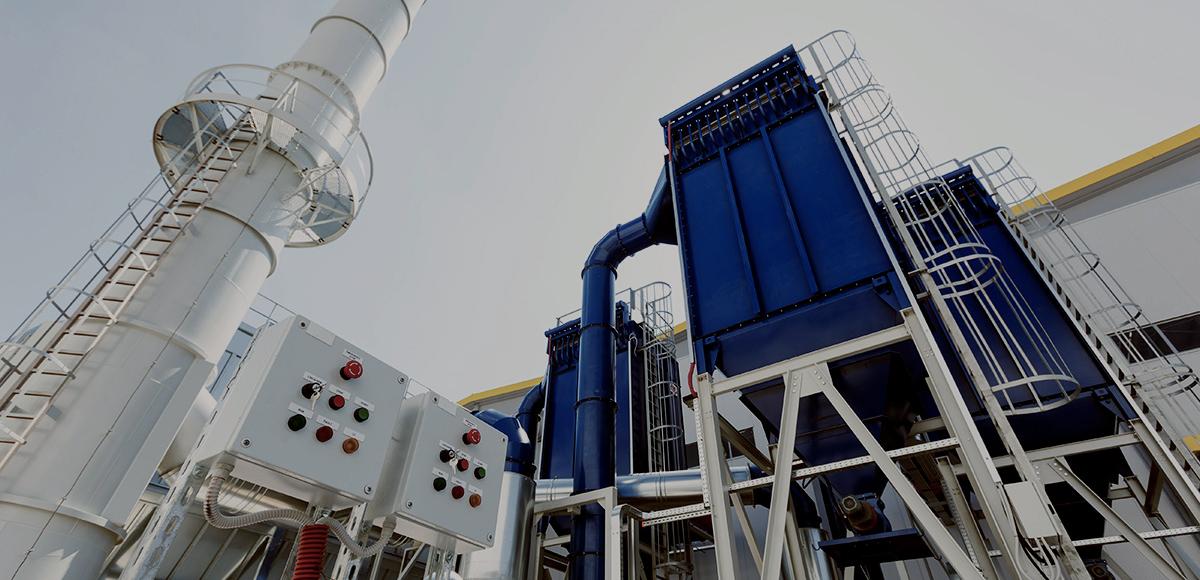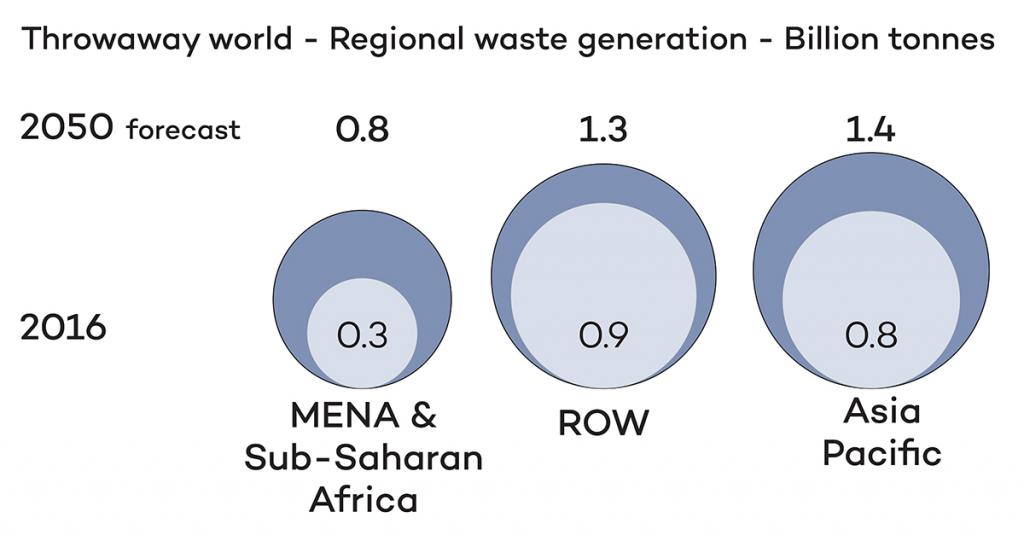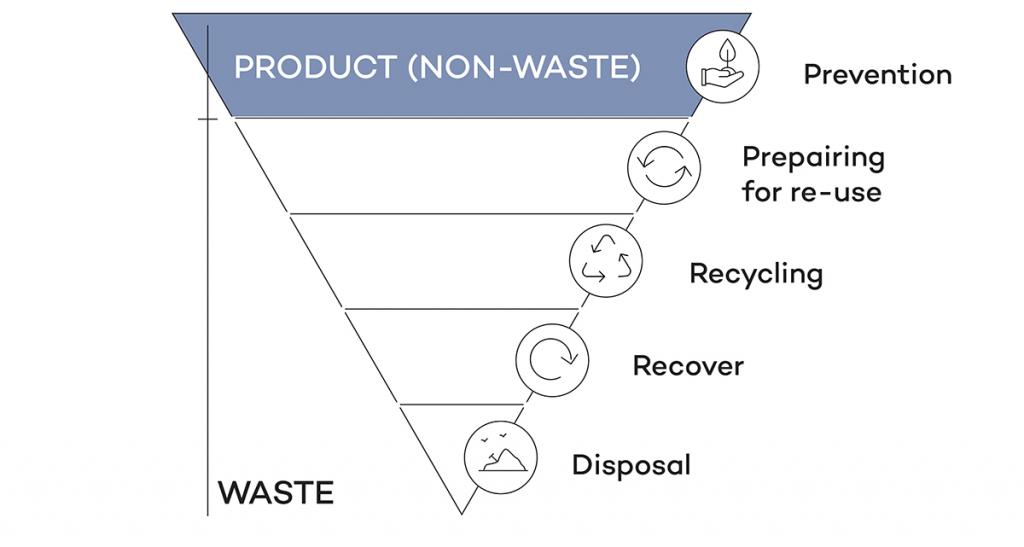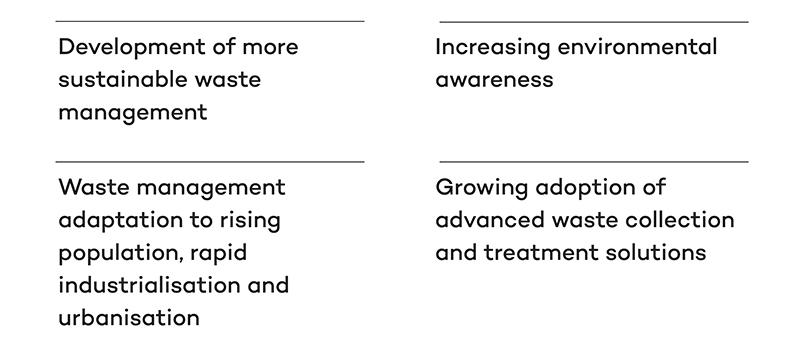
A circular future
AFRY has worked across the waste sector for several decades. In recent years, the growth in the market has escalated.
There has not been a more exciting or determined time within the industry for turning waste into value. The key to achieving sustained waste to resource management has been the public interface and interaction connection, which through a single programme, BBC’s Blue Planet II, highlighting the waste issue has led to 88% of those watching, changing their behaviour as a result. With this universal support from the public, industry and policy makers, significant progress and shifts in consumption models are leading to a rapid modernisation of previously embedded practices.
Re-defining success
Waste is defined as a material or substance that is discarded for no longer being useful or required after the completion of a process. Therefore, the more processes are successfully completed, the more waste is potentially generated. This is a linear and generally flawed process, making us, on a global scale, the victims of our own success. This is why the Circular Economy principles are the catalyst for re-defining a successful process, with the use of previously defined ‘waste’ as a ‘resource’, as it is still required to allow for a continually extended life cycle of the given resource. Facilitating the ‘re-definition’ is how resource and waste management consultants will implement positive change and growth.
A maturing waste market
The current global waste market size is valued at approximately 2,000 billion dollars per annum and is expected to reach 2,340 billion dollars per annum by 2027 (a 17% increase). A combination of policy changes intended to meet sustainability targets, introducing improved collection and treatment, is fuelling this increased market. This is strengthened further by a rapid and intense urbanisation of populations, as throughout the world in 2012, urban populations produced 1.3 billion tonnes of municipal solid waste (MSW), and is anticipated to reach 2.2 billion tonnes by 2025 (a ~70% increase) placing greater pressure on disposal services.
However, this continuing development of the waste market includes industrial waste along with MSW through the increased industrialisation in strongly growing economies such as India and China. As the economic structures of these countries develop, the amount of associated waste will overshadow individual prosperity, for at present, people living in India produce 0.34 kg of waste per day, whereas a typical American produces 2.58 kg of waste per day.
Whilst Sub-Saharan Africa does not reach the same levels of overall waste quantity as Asia Pacific (which is projected to double by 2050), it is expected to more than triple current levels of waste streams. This tripling of waste output has an even greater impact in the context of limited waste management infrastructure, typically having the highest impact amongst vulnerable communities.

Environmental policies – a double-edged sword
As mentioned, environmental policies play a significant role in driving long and sustained improvement in general waste management practices. Within the EU, acceleration of environmental targets and greater government and public support for these targets has made successful movement up the waste hierarchy more readily achievable.

However, there is another side to these changes, in 2017 China's ‘Operation National Sword’ policy initiative provided a standpoint to limit and more stringently review recyclable waste imports. Replacing waste exports to China led to the following changes:
- Improved the quality of renewables
- Banned certain items
- Reduced volume licences
These combined changes provided the conditions for a more stable and controlled input of materials which has prompted higher overall quality of resource outputs from existing infrastructure and laid the foundations for further sustained growth domestically and on the international market.
Consequently, further South East Asian countries are considering the application of similar policies. Hence, the waste industry will need to adapt to forthcoming significant supply chain amendments and a new focus towards responsible disposal and extended duty of care for all materials on an international level.
Data driven solutions & digitalisation
One of the biggest changes to the waste market has been the digitalisation of previously analogue systems, which has been powered by use of waste data, such as smart waste collection systems, radio-frequency identification (RFID) and smart bin sensor designs leading to the improved collection and quality.
Yet key to understanding the data are the metrics behind waste, especially as waste material is driven higher up the hierarchy. As the ultimate goal for resource and waste management is the ‘prevention’ of waste, there have to be robust and confident metrics to quantify the material that has never existed for customers or consumers.
At this point, carbon comparisons, or expressing waste in monetary value, are becoming ever more valuable tools in defining environmental performance, resulting in identifying new channels for waste minimisation and value creation from waste.
Resource and waste management post-Covid
The market is currently in a process of adapting to an environment of post-Covid waste management, returning to a similar form prior to the significant challenges that were posed to the waste management sector, for healthcare type waste and single-use plastics.
As temporary relaxation on use of single use plastics will have altered previous consumer behaviour, renewed initiatives for social responsibility, corporate action and government policy will increase in frequency to return to previous long-term circular economy targets. This means a requirement for innovation in existing products and technologies to achieve sustainability whilst building additional capacity for future challenges.
What does the new normal mean for circular economy?
The following are the key highlights anticipated for the future of resource & waste management:

We are constantly expanding our work in these dynamic fields and bringing together the diverse resource and waste management skill sets within AFRY. If you have any questions, please reach out to us.
Written by Gregory Logelain




